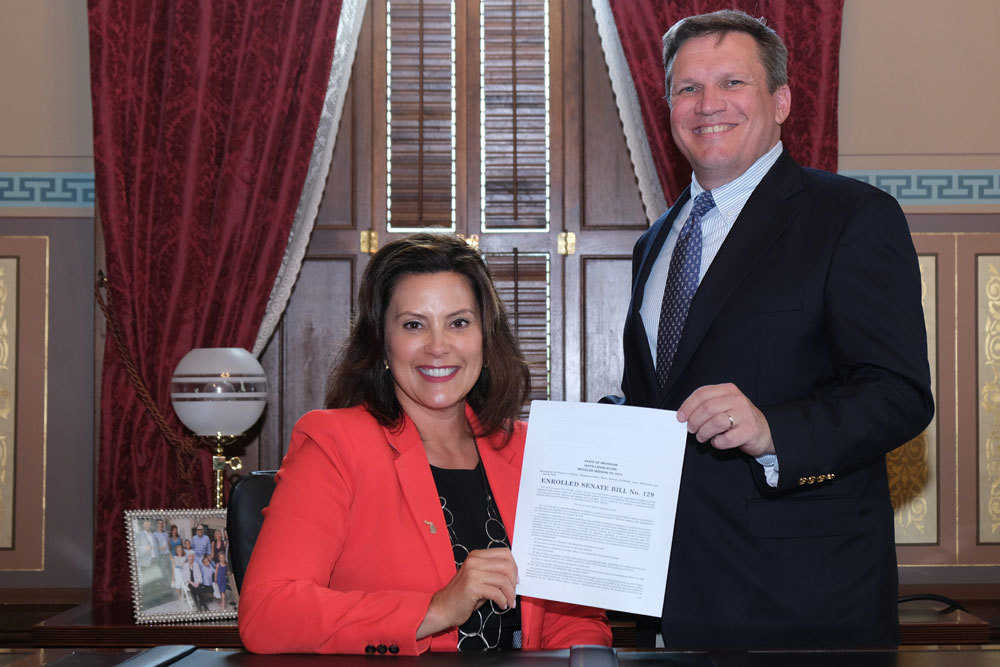Michigan Gov. Gretchen Whitmer
Michigan Gov. Gretchen Whitmer
A nonprofit research and educational institute is applauding Michigan Gov. Gretchen Whitmer’s approach to deal with the coronavirus pandemic by reducing regulator oversight in some areas.
Whitmer issued an executive order that eases restrictions on medical workers, hospitals and care facilities in an effort to deal with the immediate threat of the COVID-19 outbreak.
“To provide necessary protections against the dangers to this state posed by the COVID-19 emergency, the state must ensure that there is an adequate supply of health care providers and facilities,” Whitaker stated in the order. “To this end, it is reasonable and necessary to provide limited and temporary relief from certain regulatory requirements to enhance the operational capacity and efficiency of health care facilities.
The order was issued March 10 and is in effect through April 14.
Whitaker also moved to expand access to telemedicine so that more patients can be seen by doctors via webcams. That will ease the crowding at health centers and reduce the risk of exposure.
The Mackinac Center for Public Policy had urged the governor to adopt such policies immediately.
“Allowing health care providers greater flexibility and creativity to meet new demands is a critical step to ensure that more Michiganders receive care,” said Lindsay Killen, vice president of strategic outreach and communications at the Mackinac Center. “Gov. Whitmer’s actions to temporarily relieve these regulatory burdens — particularly CON, telehealth, and scope-of-practice restrictions — could have a significant impact on improving patient care during this time.”
Holly Wetzel, communications coordinator for The Mackinac Center, said her organization favors a careful, thoughtful approach to protect people while also ensuring as little damage to the economy and overall fiscal health of Michigan.
“We recently released a statement of support for Gov. Whitmer's decision to temporarily loosen government restrictions on medical workers, hospitals and care facilities,” Wetzel told Capitol News.
The center said Michigan has to balance the needs for safety and ensuring public health with a long-range look at the state’s future. The Mackinac Center has teamed with other organizations to make the point.
“We recently worked with the Michigan Freedom Fund and the Great Lakes Education Project to provide policy suggestions for Michigan lawmakers in light of the COVID-19 pandemic,” Wetzel said. “A wide variety of policy experts contributed to these policy recommendations and the recommendations themselves are rooted in research. The objective is to solve short-term problems in ways that don’t hamper long-term recovery so that when socialization restrictions are eased we are able to recover at the quickest pace and to the fullest extent possible.”
The report was issued March 19 as the pandemic began spreading across the country and states and cities closed schools, ordered businesses to reduce or end some services, and the media and public became focused on the potential of the virus.
“The COVID-19 pandemic poses an immediate threat to the physical health of Michiganders,” the report states. “But our state’s policy response to this crisis may affect the economic and financial health of Michigan for years to come.”
It said its goal was to the health, safety and economic opportunity of all Michiganders by working to solve short-term problems in ways that don’t hamper long-term recovery so that when socialization restrictions are eased we are able to recover at the quickest pace and to the fullest extent possible.
“The virus will harm Michiganders. But so would policies that exacerbate economic damage,” the report states. “A depressed economy will increase needs while decreasing resources; the public’s health and safety would suffer as a result.
“The right responses include prudent short-term expenditures and re-prioritizations targeted at people affected by the pandemic, along with relaxations of government authority that improve our ability to both respond to the current crisis and bolster the subsequent economic recovery.”






 Alerts Sign-up
Alerts Sign-up